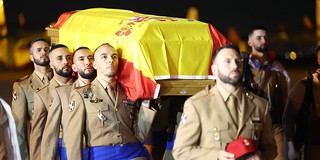The little known relationship between Spain and the famous Marines' Hymn
The Marines' is the oldest and most famous of the official military hymns of the United States Armed Forces. Do you know what its origin is?
A song featured in an Offenbach operetta
Paradoxically, the author of the score of The Marines' Hymn was not an American, but a famous French Catholic composer of German origin: Jacques Offenbach. And what relationship did this man have with the Marines? Well none. The Marine Human Resources website explains what happened:
"The music is from the Gendarmes' Duet from an 1867 revision of the 1859 opera Geneviève de Brabant by Jacques Offenbach, which debuted in Paris in 1859. Correspondence between Colonel Albert S. McLemore and Walter F. Smith (the second leader of the Marine Band) traces the tune: “Major Richard Wallach, USMC, says that in 1878, when he was in Paris, France, the aria to which the Marines' Hymn is now sung was a very popular one.”"
You can hear here the Marine Band performing that aria from Offenbach's "Geneviève de Brabant" at a concert in Chicago on December 14, 2016:
The original aria was sung in French by two gendarmes. You can listen here to the original French version of that song, performed during a performance of that comic operetta at the Festival des Châteaux in Bruniquel (France) three years ago. The song starts at point 3:51 (I've inserted the video to play from there):
Unlike the heroic Marines' Hymn, the original lyrics of this French song left the gendarmes on the floor, presenting them as cowards who only dared to be brave with women and children.
The possible Spanish origin of the music of the Anthem of the Marines
The most curious thing about this case is that the aforementioned Marines' website collects this testimony of Walter F. Smith, who was the second director of the Marine Band between 1899 and 1921:
"Major Wallach is to be congratulated upon a wonderfully accurate musical memory, for the aria of the Marine Hymn is certainly to be found in the opera, 'Genevieve de Brabant'... The melody is not in the exact form of the Marine Hymn, but is undoubtedly the aria from which it was taken. I am informed, however, by one of the members of the band, who has a Spanish wife, that the aria was one familiar to her childhood and it may, therefore, be a Spanish folk song."
There are hardly any sources that shed a little light on this. In 2009 they addressed this issue at the Forum of Naval History of Spain, talking about a Carlist version of the song that spoke about the capture of Colonel Navarro and his troops by Carlist general Antonio Dorregaray in the Battle of Eraul (1873), in Navarra, during the Third Carlist War (1872-1876).
The Carlists used that music before the Marines
The first version of Offenbach's "Geneviève de Brabant" is from 1859. Since the Carlist song refers to events that occurred 14 years later, it is surely a version of Offenbach's song, which by then would have become popular beyond the French borders. In the aforementioned Naval History forum they point out that the French composer's operetta "had a lot of acceptance - and from very shortly after its premiere - in the North of Spain." You can listen here to the Carlist song in question, entitled "When Navarro a Eraúl ascended":
If it is true that Major Wallach heard the Offenbach song in Paris in 1878, everything seems to indicate that the Carlists used the music of this song before the Marines.
The Marines' Hymn and its current lyrics
The USMC officially adopted it in 1929, with lyrics of unknown author that underwent some modifications in that year and again in 1942, in the latter case to incorporate a reference to the air component of the Corps. I leave you, without further ado, with the sung version of the famous hymn:
This is the lyrics:
From the Halls of Moctezuma
To the shores of Tripoli;
We fight our country's battles
In the air, on land, and sea;
First to fight for right and freedom
And to keep our honor clean;
We are proud to claim the title
Of United States Marine.Our flag's unfurled to every breeze
From dawn to setting sun;
We have fought in every clime and place
Where we could take a gun;
In the snow of far-off Northern lands
And in sunny tropic scenes,
You will find us always on the job
The United States Marines.Here's health to you and to our Corps
Which we are proud to serve;
In many a strife we've fought for life
And never lost our nerve.
If the Army and the Navy
Ever look on Heaven's scenes,
They will find the streets are guarded
By United States Marines.
---
|
Don't miss the news and content that interest you. Receive the free daily newsletter in your email: |
- Most read
- The brutal 'touch and go' of a Lufthansa Boeing 747 at Los Angeles Airport
- The ruins of the old Yugoslav radar station at Gola Plješevica, Croatia
- Portugal confirms that it has begun its transition to the F-35 and indicates bad news for Spain
- The deployment of Spanish soldiers of the Regulars and BRILAT near Russian territory
- Eurofighter vs F-35: the opinions of professional pilots on these advanced fighters
- Sierra Army Depot, a huge United States base with hundreds of Abrams tanks stored
- A Corporal of the Regular Forces of the Spanish Army dies in an exercise in Poland

 ES
ES







Opina sobre esta entrada: